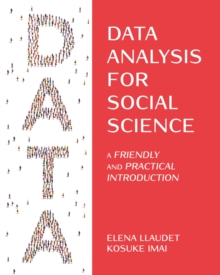Description
| Product ID: | 9780691199436 |
| Product Form: | Paperback / softback |
| Country of Manufacture: | GB |
| Title: | Data Analysis for Social Science |
| Subtitle: | A Friendly and Practical Introduction |
| Authors: | Author: Elena Llaudet, Kosuke Imai |
| Page Count: | 256 |
| Subjects: | Reference works, Reference works, Data science and analysis: general, Social research and statistics, Data analysis: general, Social research & statistics |
| Description: | An ideal textbook for complete beginners—teaches from scratch R, statistics, and the fundamentals of quantitative social scienceData Analysis for Social Science provides a friendly introduction to the statistical concepts and programming skills needed to conduct and evaluate social scientific studies. Assuming no prior knowledge of statistics and coding and only minimal knowledge of math, the book teaches the fundamentals of survey research, predictive models, and causal inference while analyzing data from published studies with the statistical program R. It teaches not only how to perform the data analyses but also how to interpret the results and identify the analyses’ strengths and limitations. Progresses by teaching how to solve one kind of problem after another, bringing in methods as needed. It teaches, in this order, how to (1) estimate causal effects with randomized experiments, (2) visualize and summarize data, (3) infer population characteristics, (4) predict outcomes, (5) estimate causal effects with observational data, and (6) generalize from sample to population. Flips the script of traditional statistics textbooks. It starts by estimating causal effects with randomized experiments and postpones any discussion of probability and statistical inference until the final chapters. This unconventional order engages students by demonstrating from the very beginning how data analysis can be used to answer interesting questions, while reserving more abstract, complex concepts for later chapters. Provides a step-by-step guide to analyzing real-world data using the powerful, open-source statistical program R, which is free for everyone to use. The datasets are provided on the book’s website so that readers can learn how to analyze data by following along with the exercises in the book on their own computer. Assumes no prior knowledge of statistics or coding. Specifically designed to accommodate students with a variety of math backgrounds. It includes supplemental materials for students with minimal knowledge of math and clearly identifies sections with more advanced material so that readers can skip them if they so choose. Provides cheatsheets of statistical concepts and R code. Comes with instructor materials (upon request), including sample syllabi, lecture slides, and additional replication-style exercises with solutions and with the real-world datasets analyzed. Looking for a more advanced introduction? Consider Quantitative Social Science by Kosuke Imai. In addition to covering the material in Data Analysis for Social Science, it teaches diffs-in-diffs models, heterogeneous effects, text analysis, and regression discontinuity designs, among other things. An ideal textbook for complete beginners—teaches from scratch R, statistics, and the fundamentals of quantitative social science
Looking for a more advanced introduction? Consider Quantitative Social Science by Kosuke Imai. In addition to covering the material in Data Analysis for Social Science, it teaches diffs-in-diffs models, heterogeneous effects, text analysis, and regression discontinuity designs, among other things. |
| Imprint Name: | Princeton University Press |
| Publisher Name: | Princeton University Press |
| Country of Publication: | GB |
| Publishing Date: | 2022-11-29 |


